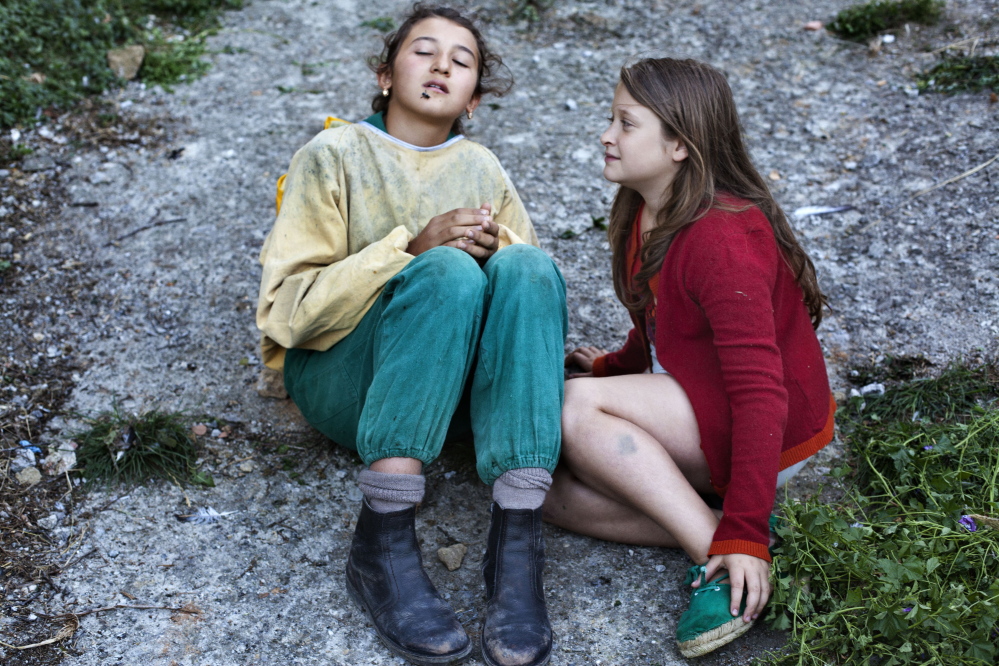“Who, being loved, is poor?”
— Oscar Wilde
German-Italian director Alice Rohrwacher’s “The Wonders” is a simple coming-of-age film set somewhere in the austere fields and farms of central Italy, where a middle-aged German-Italian beekeeper is struggling against the odds to keep home and hearth and a growing family of girls together.
Wolfgang (Sam Louwyck) is a boorish and uneducated man with zero pretensions and few employable skills. Yet he feels a deep hunger in his heart for keeping the fading traditions of the land alive.
He has, after years of stumbling through the art of beekeeping in the new rural world of pesticides, managed to put together a small business, tending to bees and making honey.
Wolfgang runs his wife and daughters with a calloused hand and barely any tenderness at all, treating them more like annoying employees than kin.
His long-suffering wife (Alba Rohrwacher), who has adjusted to the life without a future, doles out love and tenderness to her four girls, dutifully cooking the meals and perhaps secretly praying for a deliverance that will never come.
She knows Wolfgang is a well-meaning lout, but she also knew he was probably the best she could manage. They are like two reeds clinging to one another against the cold wind of a world rushing by.
The brightest flower in Mama’s bouquet of children is the oldest, 12-year-old Gelsomina (a startlingly good amateur, Maria Alexandra Lungu) who apparently has bonded the traits of both parents with a sense of German responsibility and the Italian gene for romantic fatalism.
Each day Gelsomina, after tending to her siblings, suits up in suffocating gear and goes with her father to harvest the boxes in the surrounding fields and woods. She is unafraid of the bees, and sensing her calm, they never sting her.
It’s apparent that one day, should she survive, she will wind up running the business. Remarkably, at her tender age, she has mastered the craft of making honey, even in these rustic surroundings, and cleverly kept her father’s rages to a minimum. A woman in the making.
When a local troubled teens’ home offers Wolfgang a boy for summer work as a farmhand, he takes him on. The boy, Martin (Luis Huilca Logrono), is obviously troubled and probably autistic. He will soon find a soul mate in the gentle Gelsomina.
Into the lives of all in this countryside, a Rome television show, “Countryside Wonders,” comes to the area searching for a traditional Italian family. A talent segment is required, and the winner will receive a cash prize and of all ridiculous things, a luxury cruise. With the neighbors all hungry for a spot of urban excitement, Wolfgang allows Gelsomina to enter. She and Martin work out a sweet little act. He whistles strange tunes like a bird, while she allows bees to crawl inside her mouth and about her face. It’s a stunning thing to watch.
Rohrwacher’s film is dotted with comic bits like what Italy’s Federico Fellini used to employ. The television show is full of corny gags and cheap, colorful sets to please the locals.
“Wonders” is a sweet, often charming film with touches of love and kindness and heart-tugging moments tucked into the stark gray daily life, like strawberries in a bowl of ashes.
Rohrwacher’s script is a simple one, perhaps even autobiographical? The area, Tuscany, is where she grew up. The actors are all excellent, but it’s Gelsomina’s story, and this young actor, fair of face, with eyes full of hope, makes her way through it all with uncommon grace and talent. Bravo.
J.P. Devine is a former stage and screen actor.
Send questions/comments to the editors.





Comments are no longer available on this story